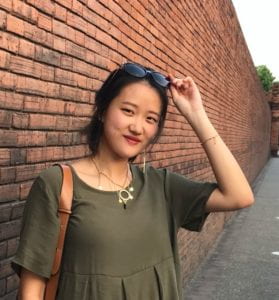Bio
 Xixi Jiang is a senior at Gallatin. Her concentration considers “legibility” of the city and the sociopolitical implications of visual and structural clarity, drawing primarily from fields of urban studies and comparative sociology. She has conducted research projects in New York and Beijing, both of which explore the ideologies of spaces and people’s collective ability to change their living environments. She is also interested in translation studies and hopes to develop her own translation projects between Chinese and English in the near future. Right now, she is the executive editor of Compass, Gallatin’s interdisciplinary research journal and a member of DCA (Dancer-Choreographer Alliance). Xixi is thrilled by the opportunity to work with Right To The City Alliance as a fellow in the upcoming summer. She hopes to contribute her labor to a cause dear to her heart and learn about organizing and advocacy first-hand from local community leaders.
Xixi Jiang is a senior at Gallatin. Her concentration considers “legibility” of the city and the sociopolitical implications of visual and structural clarity, drawing primarily from fields of urban studies and comparative sociology. She has conducted research projects in New York and Beijing, both of which explore the ideologies of spaces and people’s collective ability to change their living environments. She is also interested in translation studies and hopes to develop her own translation projects between Chinese and English in the near future. Right now, she is the executive editor of Compass, Gallatin’s interdisciplinary research journal and a member of DCA (Dancer-Choreographer Alliance). Xixi is thrilled by the opportunity to work with Right To The City Alliance as a fellow in the upcoming summer. She hopes to contribute her labor to a cause dear to her heart and learn about organizing and advocacy first-hand from local community leaders.
Project Summary
Xixi worked on the Green New Deal network team for Right to the City. She represented RTTC at coalition meetings and attended one-on-one meetings with member groups to build relationships with local communities and get their feedback for Green New Deal initiatives. Xixi worked to negotiate the tension between local and national priorities and to make sure that RTTC represented its communities in a responsible way while serving on the Green New Deal network.
Mission Statement
Something I’ve noticed and developed a sustained interest in is the NYC “Open Streets” program: designed to retain some degree of normalcy, these vehicle-free streets are generally seen as a welcome invention. This summer, with the guidance of RTC, I would like to examine the rationale behind where these pedestrian-only streets are placed, and their effects on the surrounding businesses, residents, and communities. And, more broadly, I’m interested in what people are talking about when they talk about public places, especially in the context of the pandemic, when these notions have been contested. By investigating these questions, I hope to highlight the positive impact of public places on lived experiences, and explore ways to take ownership of these democratic spaces from a grassroots perspective.
The Gallatin Global Fellowship in Urban Practice provides funding of up to $5,000 and support for 6-10 advanced BA and MA students to pursue extended, community-engaged, practice-based research projects in partnership with urban social justice organizations.
